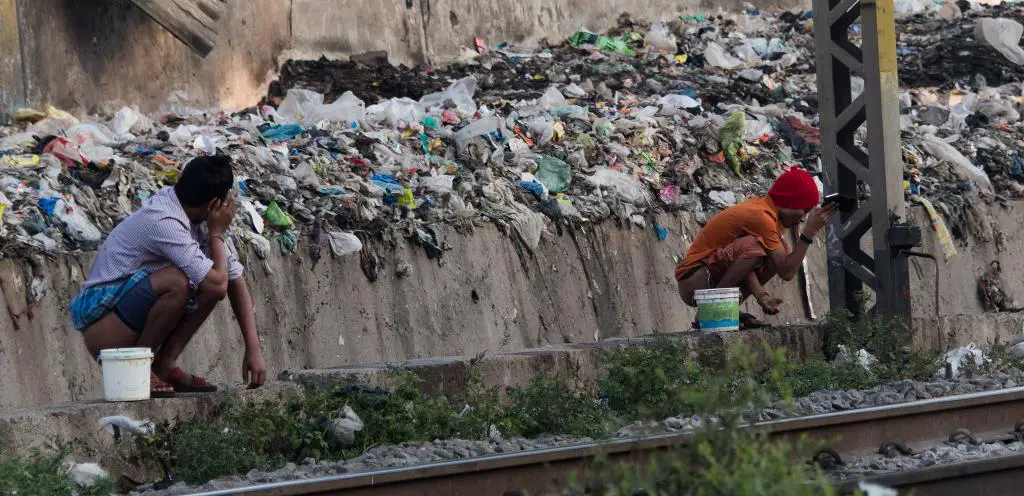Nature is ineludible, and no one can decline when it calls. But could this be the reason why a lot of Nigerians answer its call in a hideous manner that could imply negative notions apart from classifying humans as the worst species on earth?
Today, it’s customary to find human faeces everywhere and anywhere, in major cities all over the country. From the backyard of an average Nigerian home to public places such as footpaths, street roads, playgrounds, filling stations, railways, highways, prayer houses, stadiums, airport terminal buildings.
There are faeces in every direction! Sadly, We have earned the rating of the number 1 country with the highest number of people who defecate openly in Africa, and the second in the world with India earning the top spot on the list.
Nigeria loses N455billion naira on yearly bases as a result of poor sanitation as 47million Nigerians excrete in the open according to the 2018 National Outcome Routine Mapping NORM report.
Mahatma Gandhi wasn’t far from the truth in 1923 when he said: “Sanitation is more important than independence.” He believed that adequate sanitation, safe water and good hygiene could significantly reduce the rate of disease outbreak and better the lives of the people especially children in the third world countries such as Nigeria.
Every society is best known for their approach to and management of human waste. But does this apply to Nigeria as well?
In Lagos and other major cities across the nation, it has become a usual thing to find people eating, drinking, sleeping and even selling food items beside human faeces.
A lot of questions are being asked on why a lot of Nigerians engage in open defecation, but there have been no straight answers to these questions.
Though, some people blame it on the government for not providing toilet facilities in public places and due to the poverty rate in the country. But in areas where provisions are made for toilet facilities, people still indulge in open defecation.
Mr Emeka Agwuenyi is one of does people who enjoy defecating in the open. He has said that even with his education, he still can’t resist doing it in the bush.
Agwuenyi had said that he couldn’t afford to do it in a small room all the time, that is why whenever he goes to the village, he feels free to do it in the bush.
Like Emeka, a lot of people believe that defecating in open places gives them a sense of freedom, fulfilment and joy, while others do it due to their traditional beliefs such as ‘it is an abominable act sharing the same toilet with women of reproductive age.
According to experts, open defecation is when humans empty their bowels in public places without the use of proper sanitary facility designed to handle human waste such as the toilet.
Emeka, like the rest of the 47million people, is ignoring the consequences their actions have on the general hygiene of the society.
According to the World Health Organisation, WHO, ‘pooping in public could lead to severe adverse effects on the environment and general health.
Effects
One of the impacts of this unsanitary act according to UNICEF is the spread of water-borne diseases. When faeces are passed near waterways, the contaminated water flows into the water system and ends up in the primary water source.
When people fetch this water for cooking and drinking, they are then infected with waterborne diseases such as trachoma, cholera and typhoid.
Open defecation also leads to vector-borne diseases. When the human waste gathers into heaps, it attracts insects such as flies which perches on the faeces they then fly around disease-causing microbes.
When people unknowingly ingest food items already contaminated by these insects, they are then infected with diseases like cholera.
Open defecation also causes malnutrition in children. Once a child is infected with one of the diseases caused by this unsanitary and hygienic act, they start lacking the appetite for food and lose a lot of body fluids.
Other illnesses most commonly transmitted from open defecation are regular stomach upset, increased cases of Diarrhoea and poor overall health.
Diarrhoea, for example, deprive its victims of making long trips due to constant bowel attacks. So when nature calls, they have limited time to locate a toilet facility, and the alternative is passing the waste where they had the attack.
In the end, the same problem that started the disease is created and results in more people getting infected and fewer people using the facilities, thus creating more opportunity for the disease to spread and more people getting affected.
The environment is also affected by this unsanitary act because extremely high amounts of toxins are released into the ecosystem that it cannot decompose or handle at a time which leads to the piling up of filth.
When the rains come, the microbes are then washed into the aquatic system causing harm to the marine life.
Cost of defecating in the open
The 2018 NORM report estimates that around 47 million Nigerians defecate in public places while another 75 million do not have proper toilet facilities.
Among these numbers include women and children who are left vulnerable to the contracting of these disease as they live in these unsanitary conditions, eat and drink contaminated food items.
The survey which was conducted by the National Bureau of Statistics, NBS, Federal Ministry of Water Resources and the United Nations Children’s Fund, UNICEF, and was presented at a media workshop in Port Harcourt by UNICEF Chief of Water Sanitation and Hygiene, WASH, Mr Zaid Jurji.
Jurji explained that the nation loses N455 billion (US$ 1.3b) annually to poor sanitation and this amounts to one percent of the GDP of the country.
The UNICEF chief further explained that people are vulnerable to diseases such as typhoid, polio, dysentery, cholera, viral hepatitis, diarrhoea as they are forced to defecate in the open due to lack of proper sanitary facilities.
Jurji blamed the losses on the cost of health care, reduced productivity and time as well as premature deaths.
Lamenting on the adverse effects of open defecation on Nigeria, Jurji stated that the lack of WASH had contributed to the death of 90 per cent of 122,000 Nigerians, including 87,000 children under five, who die from diarrhoea each year.
Way Forward
The UNICEF chief had cited that for Nigeria to attain an open defecation free society, the government should invest more on sanitation and draft a separate budget for hygiene.
He stated that Nigeria only needs a total of N234 billion to completely eradicate open defecation and reclaim up to N359.1 billion (US$ 1.026 billion) in profit from the N455million it loses each year to poor sanitation.
Jurji also called on the government to declare a state of emergency in the health sector, propose bills/laws to promote sanitation across the nation and take urgent action to implement open defecation roadmap.
However, critical health watchers believe that the involvement of not only the government but also individuals and households in providing toilet facilities and proper waste disposal as well as creating awareness campaigns aimed at correcting the shared beliefs and fundamental norms of the people could help to combat the unsanitary act.













